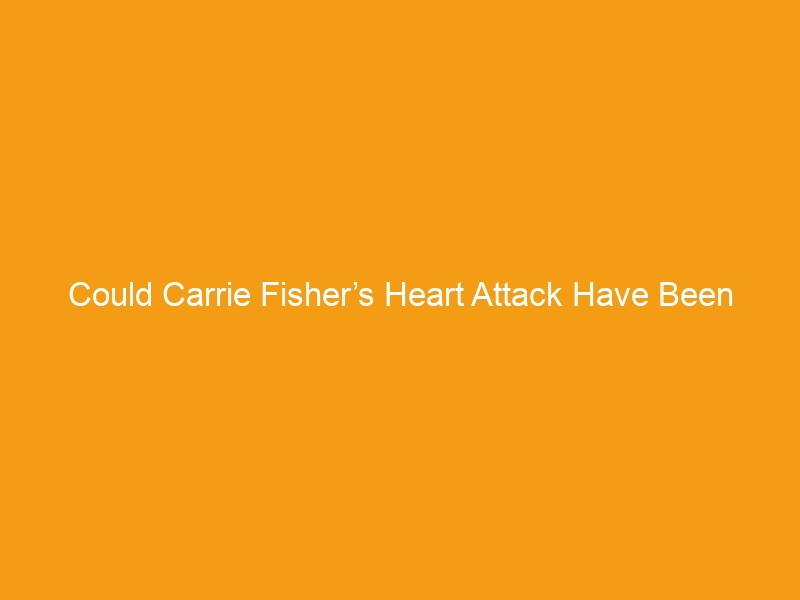Carrie Fisher, star of the beloved Star Wars franchise, died days after suffering a heart attack on a plane at age 60. But could her heart attack have been prevented? If so, what do women need to know to take preventative care? Joy Stephenson-Laws and her team of medical doctors and experts at pHlabs are authors of the new book Minerals – The Forgotten Nutrient: Your Secret Weapon for Getting and Staying Healthy and have essential information women need to know about heart care below.
Could Carrie Fisher’s Heart Attack Have Been Prevented?
The pH professional health care team
Carrie Fisher, star of the beloved Star Wars franchise, died days after suffering a heart attack on a plane at age 60. Fans around the world were shocked, but should we really be so surprised? Heart disease is the number one killer of men and women in the United States. In fact, heart attacks kill six times as many women as breast cancer! One in three women die of heart disease; that’s approximately one every minute, according to the American Heart Association (SHARE THIS STAT WITH FRIENDS – TWEET IT!).
But for some reason, heart disease isn’t really on our radar. A 2011 MetLife Foundation survey found that Americans most feared cancer, followed by Alzheimer’s. But heart disease, despite being the No. 1 killer, lagged far behind.
In fact, only around 20 percent of women believed heart disease was their top threat, the American Heart Association said. Perhaps we are not paying as much attention to heart disease prevention as we should!
Heart attack symptoms and what to do
According to the National Heart, Lung, and Blood Institute, the most common symptom of a heart attack, in both men and women, is chest pain or discomfort. It may be very mild at first, or it may be intense and sudden. In one study, a third of patients who had heart attacks experienced no chest pain (and they were more likely to be older, female or diabetic), the institute said. Symptoms can also vary from person to person, and can be different from one heart attack to the next.
Women are also more likely to have shortness of breath, nausea and vomiting, unusual tiredness, and pain in the back, shoulders and jaw.
Signs you may be having a heart attack
If you have any of these signs, call 911 right away, even if you aren’t sure whether you’re having a heart attack:
- Chest pain or discomfort
- Upper body discomfort (pain or discomfort in one or both arms, back, shoulders, neck, jaw or upper part of the stomach (above the belly button))
- Shortness of breath
- Breaking out in a cold sweat
- Feeling unusually tired for no reason, sometimes for days
- Nausea and vomiting
- Light-headedness or sudden dizziness
- Any sudden, new symptoms or a change in the pattern of symptoms you already have (for example, if your symptoms become stronger or last longer than usual)
What can you do now to prevent heart disease?
The American Heart Association recommends you:
- Don’t smoke
- Manage your blood sugar
- Get your blood pressure under control
- Lower your cholesterol
- Know your family history
- Stay active
- Lose weight
- Eat healthy
Also ensure you are getting enough minerals in your diet!
Minerals play an important role in your heart health, but they aren’t on many people’s radar! That’s why we consider them “the forgotten nutrient.” But for those who are proactive and know about them and how they affect your health, they can be your best secret weapon. Magnesium is a perfect example of this.
Magnesium loosens up tight blood vessels, reduces inflammation, and keeps all the electrical activity of the heart behaving properly.
Low magnesium levels may result in atherosclerosis (plaque formation in the arteries), calcifications (calcium deposits in the blood vessels), or blood clots. All of these increase the risk of a heart attack.
When calcium causes contraction, squeezing and high blood pressure, magnesium is a relaxer.
Sodium and potassium are also critical when it comes to preventing heart attacks. Your doctor may have told you that reducing your sodium intake can help to lower high blood pressure (also called hypertension). Hypertension increases your risk of a heart attack. But what your doctor may not have told you is that a good balance of sodium and potassium can also help to reduce blood pressure. Increasing your potassium intake while reducing sodium your diet may improve hypertension.
And those are just a few examples! You can read more about the role minerals play in your heart health in Minerals – The Forgotten Nutrient: Your Secret Weapon for Getting and Staying Healthy.
Be proactive
Be proactive and ask a knowledgeable health care professional about what preventive tests and screenings would benefit you.
Be proactive and keep reading about heart health!
Enjoy Your Healthy Life!
The pH professional health care team includes recognized experts from a variety of health care and related disciplines, including physicians, health care attorneys, nutritionists, nurses and certified fitness instructors. To learn more about the pH Health Care Team, click here. Check out their new book Minerals – The Forgotten Nutrient: Your Secret Weapon for Getting and Staying Healthy.

